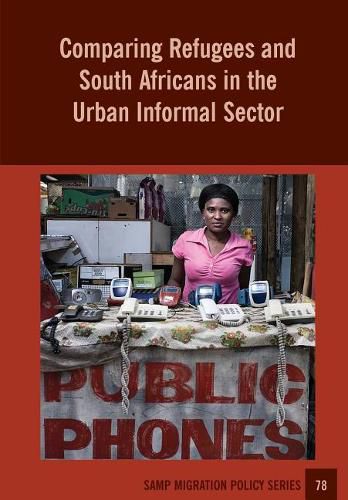Readings Newsletter
Become a Readings Member to make your shopping experience even easier.
Sign in or sign up for free!
You’re not far away from qualifying for FREE standard shipping within Australia
You’ve qualified for FREE standard shipping within Australia
The cart is loading…






This title is printed to order. This book may have been self-published. If so, we cannot guarantee the quality of the content. In the main most books will have gone through the editing process however some may not. We therefore suggest that you be aware of this before ordering this book. If in doubt check either the author or publisher’s details as we are unable to accept any returns unless they are faulty. Please contact us if you have any questions.
This report compares the business operations of over 2,000 South Africans and refugees in the urban informal economy and systematically dispels some of the myths that have grown up around their activities. First, the report takes issue with the perception that South Africans are inexperienced and unmotivated participants in the informal economy. Many have years of experience and have successfully grown their businesses. Second, it contests the view that refugees enjoy a competitive advantage because they come to South Africa with inherent talent and already honed skills. On the contrary, over 80% of those surveyed had no prior informal sector experience and learned their skills on the job and after coming to South Africa. Third, the report shows that there is fierce competition in the urban informal sector between and within the two groups. However, business competition between refugees and South Africans is mitigated by the fact that they tend to dominate different sections of the informal economy with South Africans dominant in the food sector and refugees in the household products and personal services sectors. Finally, the report takes issue with recent arguments that all informal sector businesses are equally at risk from robbery, extortion and other crimes. It shows that South Africans are affected but that refugees are far more vulnerable than their South African counterparts. The report therefore confirms that xenophobia and xenophobic violence are major threats to refugees seeking a livelihood in the informal sector, especially if they venture into informal settlements.
$9.00 standard shipping within Australia
FREE standard shipping within Australia for orders over $100.00
Express & International shipping calculated at checkout
This title is printed to order. This book may have been self-published. If so, we cannot guarantee the quality of the content. In the main most books will have gone through the editing process however some may not. We therefore suggest that you be aware of this before ordering this book. If in doubt check either the author or publisher’s details as we are unable to accept any returns unless they are faulty. Please contact us if you have any questions.
This report compares the business operations of over 2,000 South Africans and refugees in the urban informal economy and systematically dispels some of the myths that have grown up around their activities. First, the report takes issue with the perception that South Africans are inexperienced and unmotivated participants in the informal economy. Many have years of experience and have successfully grown their businesses. Second, it contests the view that refugees enjoy a competitive advantage because they come to South Africa with inherent talent and already honed skills. On the contrary, over 80% of those surveyed had no prior informal sector experience and learned their skills on the job and after coming to South Africa. Third, the report shows that there is fierce competition in the urban informal sector between and within the two groups. However, business competition between refugees and South Africans is mitigated by the fact that they tend to dominate different sections of the informal economy with South Africans dominant in the food sector and refugees in the household products and personal services sectors. Finally, the report takes issue with recent arguments that all informal sector businesses are equally at risk from robbery, extortion and other crimes. It shows that South Africans are affected but that refugees are far more vulnerable than their South African counterparts. The report therefore confirms that xenophobia and xenophobic violence are major threats to refugees seeking a livelihood in the informal sector, especially if they venture into informal settlements.